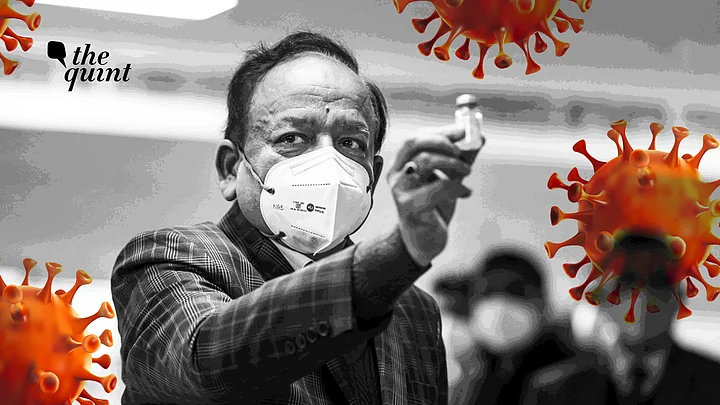As Union Health Minister, Dr Harsh Vardhan presided over the most difficult phase the country has recently seen, the coronavirus pandemic, that landed on India’s shores on 30 January, 2020. As the world grappled with the unknown enemy, India stumbled in its response. Experts debated if India had shut its borders too late, if the basics of public health – contact, trace, isolate – where abandoned too soon and if the lockdown served its purpose.
A year and half down the line, with a new health minister at the helm, and Dr Harsh Vardhan being shuffled out, there is a sense that perhaps the government has acknowledged mistakes in its handling of the pandemic.
But at no point was the health minister’s job going to be easy. And he didn’t help his cause.
India’s Pandemic Response: A Game of Perception Management
At the start, with a doctor at the helm of Health Ministry and daily briefings from his team, there was a sense of ‘work being done’.
But as the virus spread rapidly, shortages of basic medical equipment like PPEs, lack of ICU beds and ventilators and the inability of India’s woefully underprepared, decades neglected healthcare infrastructure to suddenly rise to the occasion became glaringly obvious.
There were specific questions already being asked about why India had not placed orders for importing PPEs on time, test kits, reagents, ventilators, a host of tools needed to mount a massive public health response.
Questions were also being asked of the ministry on pricing of RTPCR tests in private hospitals, cost of medicine, lack of quarantine facilities and the lockdown itself that led to a massive human tragedy.
Much like the rest of the world, several Indian pharmaceutical companies had thrown their hat in the ring in search of a vaccine. With the support of Indian Council of Medical Research and National Institute of Virology, an indigenous vaccine developed by Bharat Biotech was beginning to look like a very real possibility.
What should have been a joyous celebration turned into a mockery when ICMR head Dr Balram Bhargava wrote to several Indian institutes to complete clinical trials for the vaccine by 15 August 2020, India’s Independence Day.
Bluster over science, a strange euphoria and sense of nationalism over rationality – vaccines take time to develop, to be tested, to be put through scientific rigor. Vaccines are not about politics, it’s about saving lives.
What prompted ICMR, a scientific body, to push for this?
A doctor minister at the helm should have known better.
With some of the best public health experts in the world at its disposal, why was the Health Ministry relying heavily on technocrats to inform its policy making?
Why was the health minister hobnobbing with businessmen like Ramdev peddling a concoction called Coronil as a cure for COVID-19?
As the first wave peaked across the country, the cost of lifesaving medicines and lack of hospital beds became the headlines. Many died waiting outside hospitals, but the health ministry was focusing on skewed statistics.
‘India had among the lowest death rate in the world. India’s positivity rate was the highest.’
India’s first wave was ebbing, and the theory of Indian exceptionalism was given a stamp of approval by the health minister and prime minister himself.
Nationalism first: So, on 1 January 2021, India gave emergency use authorisation to two ‘made in India’ vaccines. Serum Institute’s Covishield and Bharat Biotech’s Covaxin. Except, Covaxin was still just about launching its phase 3 trials, a critical step to assess efficacy of a vaccine. Its approval was justified under some strange grouping of words that made little sense and the health minister defended the decision robustly. All the while placing negligible orders of the vaccines themselves.
Endgame… Dr Harsh Vardhan
In January India was basking in its ‘exceptionalism’. We had defeated the virus, and India would not see a second wave. All public health measures were abandoned, public was allowed to gather in large numbers, the communication failed to keep pace with science. Even as early as February, scientists were warning of rising numbers and new variants emerging in parts of the country. The top government ministers were holding election rallies.
Amid all this, the health minister said that pandemic had reached the ‘endgame’ in India.
The ferocity with which the second wave hit the country, even as our vaccination rates remained woefully low, and mismanagement led to the terrible oxygen crisis and deaths, as the world media’s attention shifted to India, it was becoming obvious that Dr Vardhan’s ‘endgame’ was near.
The PMO was overtly taking over, briefings were being led by Niti Ayog, the Prime Minister himself was seen presiding over the crisis and holding meetings with states.
Meanwhile, Dr Vardhan was berating the states for demanding ‘too much,’ and waging a war of words, in letters no less, with a former Prime Minister who had shared suggestions on how India could manage the crisis better.
In his departure, the government wants to be seen as taking charge, cleaning up the mess, and resetting the button. But at every stage of the pandemic, the government has been complicit. The mess is not Dr Vardhan’s alone.
